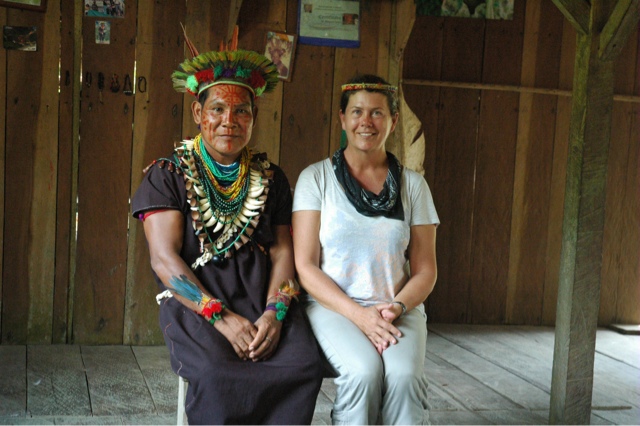A trip to the Cuyabeno Reserve, which is in the northern part of the Amazon and only about 20 kilometer from the Columbian border, starts in the town of Lago Agrio (Bitter Lake) which is still an oil town and offers very little to tourists. We arrived on the overnight bus from Quito, taking our breakfast at the local hotel just in time to see the prostitutes heading home after a busy night. Bleary-eyed and in need of a shower, our transportation finally arrived for our onward journey. We jumped in the van and were off again. It was a two hour trip to the river where we were met by a motorized canoe. After a quick lunch we loaded the canoe and were on our way into the Amazon.
Although the area had been terribly abused by the oil industry, the local people and the government have been doing a lot to restore it and to protect the remaining land and wildlife. There is more oil here in the Amazon, but there are currently discussions to pay the local people to leave the oil in the ground. There are a handful of ecolodges that are supporting the efforts and educating people about the Amazon. We stayed at the Siona Lodge which is one of the newer facilities established here. They aim to minimize the footprint of tourism in the area and amongst other things use solar power. This means we only have electricity in our rooms between 6 and 10 pm but this is quite fine with us. The nice part is that the lodge blends in beautifully with the surrounding nature with it's palm thatched roofs, bamboo railings and rough wooden walls.Knowing very little about 'the Amazon' and having a picture in my mind of a long meandering river, I was surprised at the complex waterways that we have been exploring these last few days. There are numerous lakes, lagoons, streams and rivers that seem to stretch for miles and miles. We have been told if there is no rain for a few weeks that the area where our lodge is literally dries up leaving schools of fish stranded in small ponds.
We arrived to the lodge after a two hour canoe trip and were met by our guide, Luis, at the dock. He jumped into the canoe, shoved us off again excitedly telling us we were going to see an anaconda. And, we did. We crossed the lagoon and made our way through a dense outcropping where we found her sleeping in a mud nest of sorts. What a great start to our Amazon adventure.
The last two days have been filled with canoe trips, night walks, visits to a local Shaman and Cofan village, night explorations on the river where we came up close to a Caiman, fishing for pirahnna, spotting monkeys, birds, freshwater dolphins, frogs, scorpions, spiders and other weird and wonderful insects. We heard about the complex relationships and interdependencies amongst species and plants. We have learned about the medicinal and psychotropic properties of some of the plants, how to make a pizza bread from yucca, how to weave a basket from a palm leaf and if that wasn't enough we were entertained with some local music by our guide and staff at the Siona lodge during the evening.
Now, just a quick word about our guide. Luis is a fountain of knowledge. He was born and brought up in the forest and was taught about the plants and animals by his Father. He is from a local Tribe (there are five still inhabiting the Cuyabeno: the Secoya, Siona, Cofán, Kichwa and Shuar). He spent four years in the Ecuadorian army where he learned to speak Spanish and then learned to speak English and German. Having already known about the animals, birds and plants in the area from his Father, he still wasn't qualified for a tour guide as he didn't know the official Latin terms. But he took the courses and now is a well-rounded guide with an intense and personal knowledge of the area, the people and culture and the world around him and he carries with him an enthusiasm and passion for all these things.
I hope I have left you with a sense that the Amazon is a treasure worth protecting and even with today's environmental awareness, the oil industry is still hovering to take the resources from the land which comes at a great cost to the people and wildlife. The only way to stop this is to reduce our dependency on oil. We all have to become more clever in finding ways to do this.
















No comments:
Post a Comment